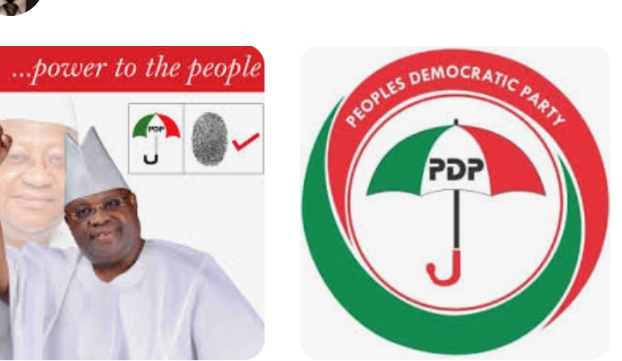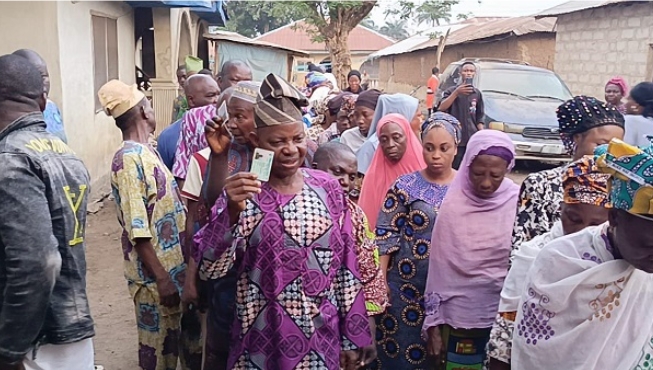News
Fitch Ratings Reduces Dangote’s Creditworthiness

News
BREAKING: Jubilation As PDP Wins All 30 LGs In Osun State(See winners)

By Kayode Sanni-Arewa
The Osun State Independent Electoral Commission, OSSIEC, has announced that the Peoples Democratic Party, PDP, won all the local government and councillorship positions in the just concluded local government elections in the state.
The Chairman of the Commission, Hashim Abioye, made this announcement via a Facebook Live broadcast on Saturday evening.
Abioye stated that PDP candidates secured all the councillorship seats in all 332 wards in the state, as well as the chairmanship elections in all 30 local government council areas.
The names of the PDP chairmanship candidates and their respective local government council areas:
Babalola Wasiu Kayode – Boripe
Okunade Oluwafemi Adesanya – Egbedore
Adeyenuwo Rotimi John – Ife Central
Agboola Francis Olajire – Obokun
Azeez Lateef Adeniran – Isokan
Aina Abayomi Adesina – Boluwaduro
Sodiq Samuel Oluwapelumi – Ola Oluwa
Ajibade Oluwatoyin S. – Irepodun
Adebanjo Oladiti Tunmininu – Ilesa West
Ibironke Alade Adegboye – Atakumosa East
Aroke Muyiwa Aderemi – Ife South
Kolade Obafemi Kolawole – Olorunda
Moshood Adekunle Kabiru – Iwo
Awotunde Abiodun Sarafadeen – Ifelodun
Akande Taiwo Adekunle – Osogbo
Dada Feyisayo Ajibola – Atakumosa West
Amodu Taiwo – Ede North
Atolagbe Kayode Olayinka – Ifedayo
Akande Michael O. – Ife North
Adeyekun Taiwo Adebayo – Oriade
Adeniran Adenike Felicia – Ayedaade
Afolabi Oyekola Lukman – Ede South
Odunyemi Haruna Bukola – Ife East
Jooda Ambali Babajide – Irewole
Adewale Adeyinka Oluwaseun – Odo Otin
Ogunbiyi Solomon Akinyemi – Ayedire
Raimi Adenike Nafisat – Ejigbo
Adebisi Jayeola Nasir – Ila
Ilesanmi Taiwo Sunday – Ilesa East
Alade Aderemi Fatai – Orolu
News
DSS arrests three for assaulting operatives during LSHA crisis

By Kayode Sanni-Arewa
The Department of State Services (DSS) has arrested three persons linked to the alleged assault on its officers during the crisis that rocked the Lagos State House of Assembly, following the removal Mudashiru Obasa, as Speaker
Apparently sensing danger, some lawmakers had mobilized their supporters to the Assembly Complex, but these supporters allegedly attacked some DSS officers who were invited by the Assembly leadership to secure the facility. Security sources revealed that “after extensive analysis of CCTV footage, we were able to clearly identify three of the suspects”.
“The suspects, Ibrahim Olanrewaju Abdulkareem, a photographer and two others attached to the Assembly’s Seargent at Arms, Adetu Adekunle Samsudeen and Adetola Oluwatosin Fatimoh, a lady, were consequently tracked and arrested during the week in different parts of Lagos,” The trio have since confessed to the crime and will soon be charged to court, the source said.
It would be recalled that the Lagos Assembly had in a leaked memo dated 14th February, 2025 and addressed to the DSS Director in the State, and Heads of other Security Agencies in Lagos State, told the Security Agencies in Lagos that, there was credible information to the effect that, Obasa had planned to forcefully reinstate himself today, February 18, 2025.
Accordingly, the Assembly management, held the view that, the development posed “a potential security threat” to it and its members.
News
Police seal OSSIEC office, officials nabbed, says chairman

By Kayode Sanni-Arewa
The chairman of the Osun State Independent Electoral Commission (OSSIEC), Hashim Abioye, has claimed that the police have sealed off the headquarters in Osogbo.
In a video post on the OSSIEC X handle, Abioye accused the police of also arresting election officials and blocking journalists from covering the local government election.
According to him, several OSSIEC officials were detained while on their way to polling units on Saturday.
Attempts by our correspondent to reach Abioye for further details proved abortive as his telephone line was switched off.
The OSSIEC chair, in the post, assured voters that materials had been deployed to affected areas.
So far so good, the reports have been positive and the conduct has been very smooth and peaceful as against the false alarm raised by the police. Everywhere is calm,” Abioye said.
“The only thing is that in some of the areas in which materials are supposed to have arrived for voters to cast their votes, we had reports of police arresting our officials.
“I don’t know on whose order because there is no court order that warranted the arrest of officers of our officials.
“As it is, we have deployed materials to those units because we have enough on the ground.
For our people in the media community, I want to apologise for the inadequacy of the tags and the jackets because we have enough but the police sealed our office and that was not warranted at all.”
Abioye’s comments come after police had called for the local government election to be called off by the state government, citing a security threat.
In a statement by its Public Relations Officer, Olumuyiwa Adejobi, on Friday, the Police said it received credible intelligence indicating a likelihood of violence and significant security threats should the planned elections proceed.
The police explained that reports gathered from joint intelligence gathering revealed that various groups, including political elements and other interested parties, are mobilising to instigate unrest, disrupt public peace and undermine the democratic order.
However, the Osun State government acknowledged the police’s advice but insisted on going on with the election.
Channels Television reports that the election eventually went on as scheduled on Saturday.
-

 News15 hours ago
News15 hours agoBook launch: Abacha’s daughter, Gumsu derides Babangida
-

 News14 hours ago
News14 hours agoSocial media in awe as former RCCG pastor ties nuptials with male lover
-

 News14 hours ago
News14 hours agoJustice Delayed: The Imperative for Accountability in the Wake of Ibrahim Babangida’s Autobiography
-

 News14 hours ago
News14 hours agoSAD: Finally, Police recover remains of soldier k!lled over unpaid N20m ransom
-

 News23 hours ago
News23 hours agoIBB’s attempt to alter history must be dismissed – Odumakin
-

 News23 hours ago
News23 hours agoTinubu Authorizes Transfer of 29 Correctional Facilities
-

 Metro23 hours ago
Metro23 hours agoDays After Massacre Of 16 Farmers, Armed Herdsmen Return To Benue Community, Kill Many Villagers
-

 News14 hours ago
News14 hours agoGov Adeleke Votes As Osun’s LG Election Begins







